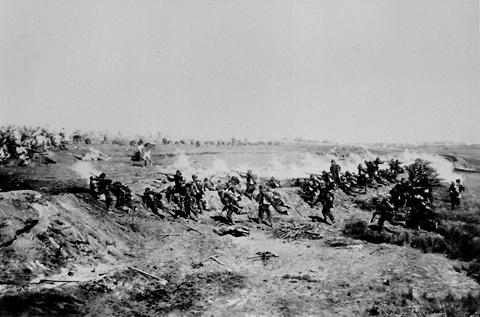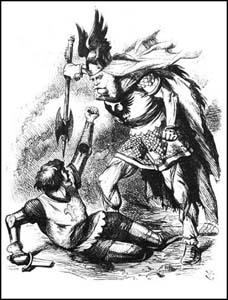A fictional account of an unsuccessful French attack during the Franco-Prussian War from Emile Zola's novel La débâcle [The Downfall] (1892)
Then the colonel of the first regiment, raising aloft his saber, shouted in a voice of thunder:
"Charge!"
The trumpets sounded, the column broke into a trot and was away. Prosper was in the  leading squadron, but almost at the extreme right of the right wing, a position of less danger than the center, upon which the enemy always naturally concentrate their hottest fire. When they had topped the summit of the Calvary and began to descend the slope beyond that led downward into the broad plain he had a distinct view, some two-thirds of a mile away, of the Prussian squares that were to be the object of their attack. Beside that vision all the rest was dim and confused before his eyes; he moved onward as one in a dream, with a strange ringing in his ears, a sensation of voidness in his mind that left him incapable of framing an idea. He was a part of the great engine that tore along, controlled by a superior will. The command ran along the line: "Keep touch of knees! Keep touch of knees!" in order to keep the men closed up and give their ranks the resistance and rigidity of a wall of granite, and as their trot became swifter and swifter and finally broke into a mad gallop, the chasseurs d'Afrique gave their wild Arab cry that excited their wiry steeds to the verge of frenzy. Onward they tore, faster and faster still, until their gallop was a race of unchained demons, their shouts the shrieks of souls in mortal agony; onward they plunged amid a storm of bullets that rattled on casque and breastplate, on buckle and scabbard, with a sound like hail; into the bosom of that hailstorm flashed that thunderbolt beneath which the earth shook and trembled, leaving behind it, as it passed, an odor of burned woolen and the exhalations of wild beasts.
leading squadron, but almost at the extreme right of the right wing, a position of less danger than the center, upon which the enemy always naturally concentrate their hottest fire. When they had topped the summit of the Calvary and began to descend the slope beyond that led downward into the broad plain he had a distinct view, some two-thirds of a mile away, of the Prussian squares that were to be the object of their attack. Beside that vision all the rest was dim and confused before his eyes; he moved onward as one in a dream, with a strange ringing in his ears, a sensation of voidness in his mind that left him incapable of framing an idea. He was a part of the great engine that tore along, controlled by a superior will. The command ran along the line: "Keep touch of knees! Keep touch of knees!" in order to keep the men closed up and give their ranks the resistance and rigidity of a wall of granite, and as their trot became swifter and swifter and finally broke into a mad gallop, the chasseurs d'Afrique gave their wild Arab cry that excited their wiry steeds to the verge of frenzy. Onward they tore, faster and faster still, until their gallop was a race of unchained demons, their shouts the shrieks of souls in mortal agony; onward they plunged amid a storm of bullets that rattled on casque and breastplate, on buckle and scabbard, with a sound like hail; into the bosom of that hailstorm flashed that thunderbolt beneath which the earth shook and trembled, leaving behind it, as it passed, an odor of burned woolen and the exhalations of wild beasts.
At five hundred yards the line wavered an instant, then swirled and broke in a frightful eddy that brought Prosper to the ground. He clutched Zephyr by the mane and succeeded in recovering his seat. The center had given way, riddled, almost annihilated as it was by the musketry fire, while the two wings had wheeled and ridden back a little way to renew their formation. It was the foreseen, foredoomed destruction of the leading squadron. Disabled horses covered the ground, some quiet in death, but many struggling violently in their strong agony; and everywhere dismounted riders could be seen, running as fast as their short legs would let them, to capture themselves another mount. Many horses that had lost their master came galloping back to the squadron and took their place in line of their own accord, to rush with their comrades back into the fire again, as if there was some strange attraction for them in the smell of gunpowder. The charge was resumed; the second squadron went forward, like the first, at a constantly accelerated rate of speed, the men bending upon their horses' neck, holding the saber along the thigh, ready for use upon the enemy. Two hundred yards more were gained this time, amid the thunderous, deafening uproar, but again the center broke under the storm of bullets; men and horses went down in heaps, and the piled corpses made an insurmountable barrier for those who followed. Thus was the second squadron in its turn mown down, annihilated, leaving its task to be accomplished by those who came after.
When for the third time the men were called upon to charge and responded with invincible heroism, Prosper found that his companions were principally hussars and chasseurs de France. Regiments and squadrons, as organizations, had ceased to exist; their constituent elements were drops in the mighty wave that alternately broke and reared its crest again, to swallow up all that lay in its destructive path. He had long since lost distinct consciousness of what was going on around him, and suffered his movements to be guided by his mount, faithful Zephyr, who had received a wound in the ear that seemed to madden him. He was now in the center, where all about him horses were rearing, pawing the air, and falling backward; men were dismounted as if torn from their saddle by the blast of a tornado, while others, shot through some vital part, retained their seat and rode onward in the ranks with vacant, sightless eyes. And looking back over the additional two hundred yards that this effort had won for them, they could see the field of yellow stubble strewn thick with dead and dying. Some there were who had fallen headlong from their saddle and buried their face in the soft earth. Others had alighted on their back and were staring up into the sun with terror-stricken eyes that seemed bursting from their sockets. There was a handsome black horse, an officer's charger, that had been disemboweled, and was making frantic efforts to rise, his fore feet entangled in his entrails. Beneath the fire, that became constantly more murderous as they drew nearer, the survivors in the wings wheeled their horses and fell back to concentrate their strength for a fresh onset.
 Finally it was the fourth squadron, which, on the fourth attempt, reached the Prussian lines. Prosper made play with his saber, hacking away at helmets and dark uniforms as well as he could distinguish them, for all was dim before him, as in a dense mist. Blood flowed in torrents; Zephyr's mouth was smeared with it, and to account for it he said to himself that the good horse must have been using his teeth on the Prussians. The clamor around him became so great that he could not hear his own voice, although his throat seemed splitting from the yells that issued from it. But behind the first Prussian line there was another, and then another, and then another still. Their gallant efforts went for nothing; those dense masses of men were like a tangled jungle that closed around the horses and riders who entered it and buried them in its rank growths. They might hew down those who were within reach of their sabers; others stood ready to take their place, the last squadrons were lost and swallowed up in their vast numbers. The firing, at point-blank range, was so furious that the men's clothing was ignited. Nothing could stand before it, all went down; and the work that it left unfinished was completed by bayonet and musket butt. Of the brave men who rode into action that day two-thirds remained upon the battlefield, and the sole end achieved by that mad charge was to add another glorious page to history. And then Zephyr, struck by a musket-ball full in the chest, dropped in a heap, crushing beneath him Prosper's right thigh; and the pain was so acute that the young man fainted. Maurice and Jean, who had watched the gallant effort with burning interest, uttered an exclamation of rage.
Finally it was the fourth squadron, which, on the fourth attempt, reached the Prussian lines. Prosper made play with his saber, hacking away at helmets and dark uniforms as well as he could distinguish them, for all was dim before him, as in a dense mist. Blood flowed in torrents; Zephyr's mouth was smeared with it, and to account for it he said to himself that the good horse must have been using his teeth on the Prussians. The clamor around him became so great that he could not hear his own voice, although his throat seemed splitting from the yells that issued from it. But behind the first Prussian line there was another, and then another, and then another still. Their gallant efforts went for nothing; those dense masses of men were like a tangled jungle that closed around the horses and riders who entered it and buried them in its rank growths. They might hew down those who were within reach of their sabers; others stood ready to take their place, the last squadrons were lost and swallowed up in their vast numbers. The firing, at point-blank range, was so furious that the men's clothing was ignited. Nothing could stand before it, all went down; and the work that it left unfinished was completed by bayonet and musket butt. Of the brave men who rode into action that day two-thirds remained upon the battlefield, and the sole end achieved by that mad charge was to add another glorious page to history. And then Zephyr, struck by a musket-ball full in the chest, dropped in a heap, crushing beneath him Prosper's right thigh; and the pain was so acute that the young man fainted. Maurice and Jean, who had watched the gallant effort with burning interest, uttered an exclamation of rage.
"Tonnerre de Dieu! [Thunder of God] what bravery wasted!"